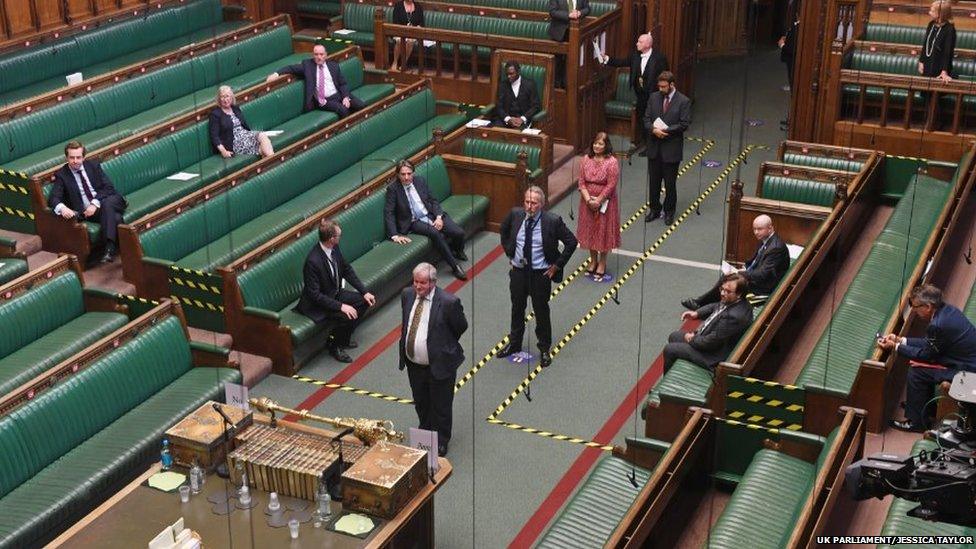Coronavirus: 'Vulnerable' MPs can stay away from Westminster
- Published

MPs will be able to "self-certify" that they cannot attend Parliament due to reasons linked to coronavirus, the Speaker says.
All MPs were ordered back to Westminster this week after a period of being allowed to work from home.
But concerns have been raised that those who are shielding for age or health reasons will be disenfranchised.
These MPs will be allowed to speak in debates and plans to allow proxy voting will be announced next week.
An online voting system, which was used on a handful of occasions, has been ditched in favour of them forming socially distanced queues to vote.
Speaking at Prime Minister's Questions on Wednesday, Boris Johnson apologised "to all those with particular difficulties because they're shielding or they're elderly" adding "they should be able to vote by proxy".
Individual MPs will not have to explain why they are not in Westminster under the new system, but in a letter to MPs Commons Speaker Sir Lindsay Hoyle said he envisaged four main categories eligible to work from home:
Members who are themselves either "clinically extremely vulnerable" or "clinically vulnerable"
Members who feel it is not appropriate for them to travel to and work at Westminster as a result of a member of their family being "clinically extremely vulnerable" or "clinically vulnerable"
Members who are required to self-isolate for a specified period in accordance with guidance or rules in the relevant jurisdiction
Members with parental or other caring responsibilities where normal arrangements which would enable them to travel to and work at Westminster are not operating normally for public health reasons
He said MPs would not qualify for virtual participation simply because their regular travel arrangements were unavailable.
Sir Lindsay emphasised that self-certifying MPs would be able to choose when to return to work, but "it will not be acceptable to participate virtually in an urgent question and then participate in person in a debate".
It comes after many MPs criticised the government's plan to end virtual proceedings and return Parliament to its usual way of working.
Many said this would disadvantage MPs who have underlying health conditions, who have been told under the government's advice to remain at home.
Stella Creasy spoke in Parliament with some chatter from baby Hettie.
The House of Lords has also announced plans to implement a hybrid system, combining virtual and physical proceedings. It says it expects most members to continue to participate via online working.
The Lords authorities have made changes to the chamber to allow for social distancing, including "improving ventilation and to minimise door handling".
The Lords will also implement an online voting system "in the coming weeks".
- Published3 June 2020
- Published2 June 2020